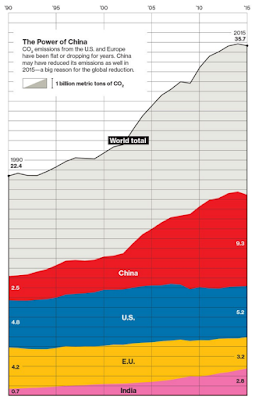An epochal change: have CO2 emissions peaked?
The projections that had been circulating during the past few months turned out to be correct. Now, it is official: the global carbon dioxide (CO2) emissions peaked in 2014 and went down in 2015. And this could be a momentous change. Don’t expect the emission peak, alone, to save us from the impending climate disaster, but, if CO2 emissions will start an irreversible decline, then we need to rethink several assumptions that we have been making on how to deal with climate change. In particular, depletion is normally assumed to be a minor factor in determining the trajectory of the world’s economy during the coming decades, but that may not be the case. Depletion is not a good thing in itself, but it might help us (perhaps) to stay within the “safe” limits and avoid a climate disaster.
CO2 emissions are mainly the result of the combustion of fossil fuels and of activities made possible by the combustion of fossil fuels. And since we expect the production of fossil fuels to peak and decline as the result of depletion, it shouldn’t be a surprise that CO2 emissions should peak too. Of course, we have to take this conclusion with a lot of caution. Personally, I was sure that emissions would peak in a non-remote future, but not so soon. For instance, Laherrere had assumed the peak for all fossils to occur not before around 2025. And many people would have seen these projections as ridiculously catastrophistic. Most of the published scenarios for the future saw CO2 emissions increasing for at least a few decades in the future unless draconian economic or legislative measures to limit them were taken.
…click on the above link to read the rest of the article…
